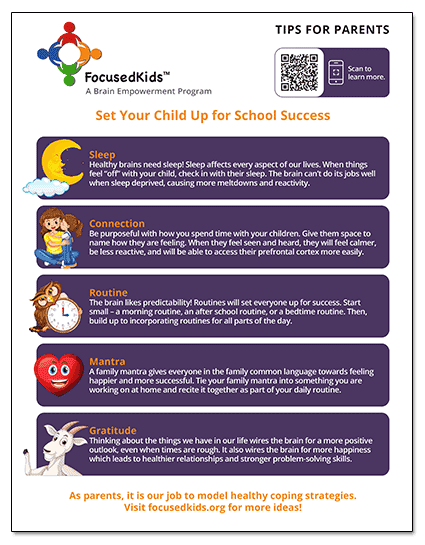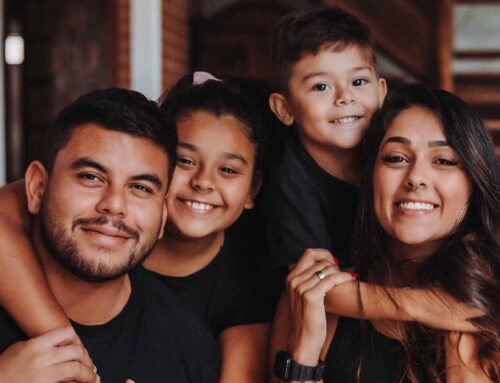Going back to school brings up a lot of feelings for everyone – parents and kids alike! The transition can feel overwhelming. Set everyone up for success this school year by establishing good sleep routines, making time to connect and talk about how the day is going to go, building predictable routines, reciting a family mantra, and practicing gratitude. Your child’s brain will thank you – and so will their teacher!
Sleep
Healthy brains need sleep! Sleep affects every aspect of your life and your child’s life. When things feel “off” with your child, check in with their sleep.
The amygdala is more likely to go on alert when sleep is off, causing more meltdowns and reactivity. Additionally, the hippocampus (memory part of the brain) and prefrontal cortex can’t do their jobs well when sleep deprived.
Connection
Be purposeful with how you spend time with your children. When they feel seen and heard by a parent, they will feel calmer, be less reactive, and will be able to access their prefrontal cortex (thinking, learning, problem-solving part of the brain) more easily.
Give your child space to name how they are feeling. “Name it to tame it” means when we name how we feel, our brain instantly calms that feeling. Naming feelings is one of the quickest ways to get back to a state of regulation.Positive language will also help the family feel more settled and better prepared for the school year ahead. Want to learn a little more about the brain? Watch our video so you can begin to use brain language at home. Learning about the brain is empowering to kids and their parents.
Routine
The brain likes predictability! Routines will set everyone up for success. Start small – a morning routine, an after school routine, or a bedtime routine. Then, build up to incorporating routines for all parts of the day.
Mantra
A family mantra gives everyone in the family a common language towards feeling happier and more successful. When parents participate in the family mantra they are modeling a healthy coping strategy for their children.
Perhaps say it in the morning as you prepare breakfast, or during dinner time or bedtime. Tie your family mantra into something you are working on at home. If sleep is the issue, your mantra could be “My body feels strong when I sleep,” or “Tonight I feel safe in my bed.” If getting out of the house on time is hard or creates big emotions, try “We will work together to get to school on time,” or “This morning I will be helpful and kind.” If dinner time feels stressful and the kids are arguing, practice saying “We are grateful for this dinner and for our day.”
Gratitude
Thinking about the things we have in our life wires the brain for a more positive outlook, even when times are rough. It also wires the brain for more happiness which leads to healthier relationships and stronger problem-solving skills. Research shows this is true not only for adults but kids as well. Learn more here.
This includes gratitude for little things like a warm cup of tea in the morning or 5 minutes of alone time, as well as big stuff like our home, our family, or a recent summer trip. Need a little help explaining gratitude to your child? Watch our video with Grateful Goat.
A family mantra gives everyone in the family a common language towards feeling happier and more successful. When parents participate in the family mantra they are modeling a healthy coping strategy for their children.
Perhaps say it in the morning as you prepare breakfast, or during dinner time or bedtime. Tie your family mantra into something you are working on at home. If sleep is the issue, your mantra could be “My body feels strong when I sleep,” or “Tonight I feel safe in my bed.” If getting out of the house on time is hard or creates big emotions, try “We will work together to get to school on time,” or “This morning I will be helpful and kind.” If dinner time feels stressful and the kids are arguing, practice saying “We are grateful for this dinner and for our day.”
Free Resources

A Parent’s Role
Remember, the prefrontal cortex isn’t fully developed until the mid-20’s. As parents, it’s our job to model and lend our prefrontal cortex to our children. Even when we think they “should” be able to pack up their backpack or they “should” be able to get out the door on time, it is up to US to model healthy coping strategies. This will allow their prefrontal cortex to develop leading to overall healthy brain development. Healthy brain development also leads to higher academic achievement, better relationships, and overall higher lifelong success.
About the Author
Shayla Groves
Shayla is the designer, marketing specialist, and brand strategist behind FocusedKids. As the mother of two, Shayla is well versed in all things parenting.



